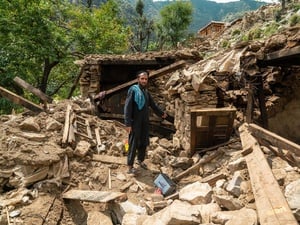Work progressing in four refugee camps in Pakistan; construction of two more sites to begin Thursday
Work progressing in four refugee camps in Pakistan; construction of two more sites to begin Thursday

View of Shalman, one of the proposed refugee camp sites in Pakistan's North West Frontier Province near Peshawar.
PESHAWAR, Pakistan, Oct. 16, (UNHCR) - Work was progressing Tuesday on four refugee camps in Pakistan's North-West Frontier Province (NWFP), with construction of two other sites expected to begin Thursday, the U.N. refugee agency said.
While UNHCR is aiming to build 15 camps in the province capable of handling up to 150,000 people, it has thus far identified nine sites. A joint UNHCR-Pakistani government team, however, was inspecting six more areas Tuesday.
Construction of the camps was being carried out by a variety of non-governmental organizations, the refugee agency said.
Work on the sites was slowed for five consecutive days last week because of the security situation in Pakistan. The agency expressed growing "concern and frustration" last Thursday at what it said were numerous obstacles that were interfering in preparations to receive as many as 300,000 additional Afghan refugees in the country.
But the security situation appears to have improved since then, with work resuming on the four camps in North-West Frontier Province.
Current crossings into Pakistan by Afghan refugees appear erratic, with an estimated 1,000 people a day entering Pakistan's Baluchistan Province over the past 30 days. An equal number are estimated to be crossing daily into NWFP. Many thousands more may have tried to enter and failed. Their current whereabouts and prospects are unknown.
An increasing number of those able to cross the officially closed borders are paying organized smuggling networks to help them, with the cost of such journeys rising daily, the agency said. It estimated that a trip from the Taliban stronghold of Kandahar in southern Afghanistan to Quetta on the other side of the Pakistani border was about $100 for a family of six - an enormous amount for most Afghans.
"UNHCR is particularly concerned about the very poor, as well as minorities," a statement said. "Minorities are almost all forced to resort to smugglers and are apparently being charged much more for everything, including transport, on both sides of the border."
With regard to Afghanistan's border with Iran, UNHCR monitoring teams over the weekend said unconfirmed reports indicated there were no large movements of Afghans in the area. "However, many have apparently left their homes in the wake of the air strikes, searching for safety in either the countryside or in the mountains," the agency said Monday. "Fear of ad hoc recruitment by the Taliban is reportedly also a factor."
On Tuesday, UNHCR announced that two more airlifts are planned for Quetta in the coming days. The first flight is scheduled to leave Denmark on Wednesday with 6,200 plastic sheets and 10,350 blankets. A second flight is planned from Norway on Thursday carrying Rubbhalls, large tent structures that can serve as warehouses.
UNHCR has operated 10 flights to Pakistan and Iran since the latest crisis began following the Sept. 11 terrorist attacks in the United States.
As it has done several times during the past week, the U.N. refugee agency again reminded donor governments it had received only some $12 million in cash contributions of an estimated $50 million needed to care for an initial planning figure of 400,000 new arrivals in countries bordering Afghanistan.
"UNHCR urgently needs funds to enable it to continue preparations and pre-positioning of relief supplies in case of any influx," the agency said Tuesday. It added that any resources could be transferred into Afghanistan itself should conditions permit in the future.
"But pre-positioning of supplies at this stage remains crucial to ensure that UNHCR can respond quickly should any major outflow begin," the UNHCR statement said.









